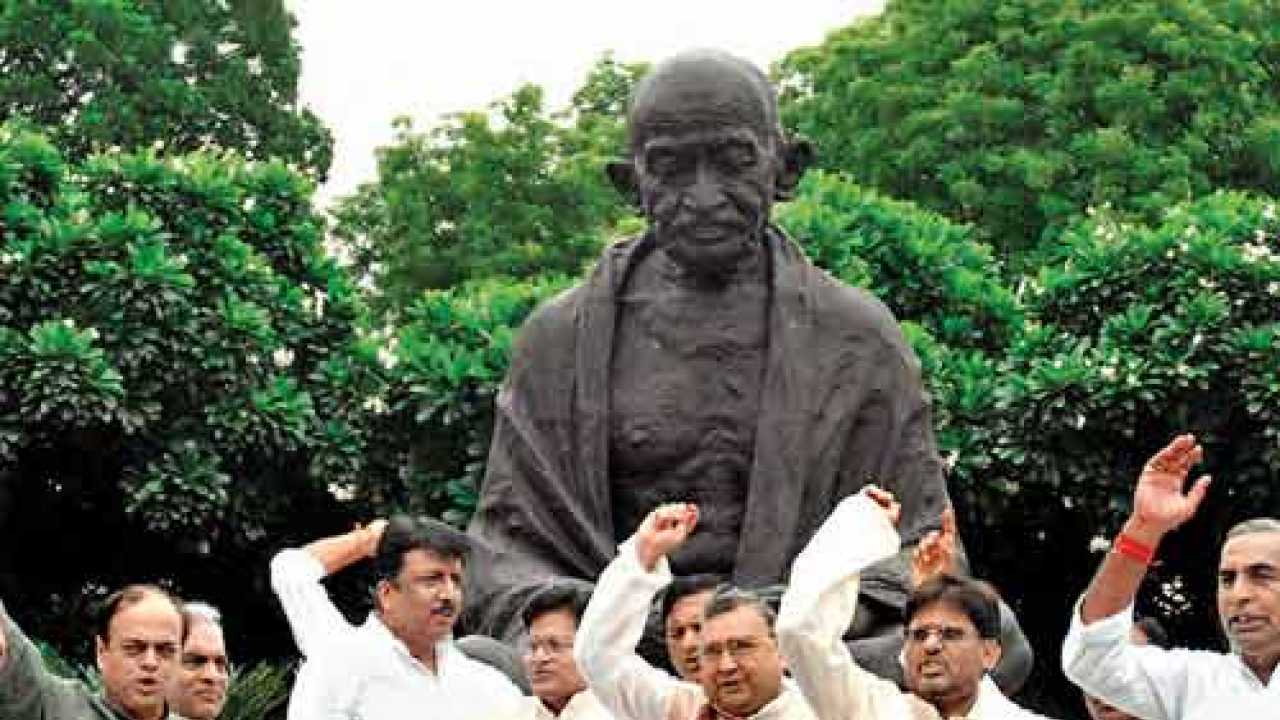
Trust Salman Rushdie to provoke an interesting line of thought this week. While speaking to those attending the Edinburgh International Book festival, the Best of the Booker winner declared that we were now living in an “Age of offendedness” where people were defined by things they hated instead of the things they loved.
Rushdie went on to link this phenomenon with the rise of religious fanaticism, which I’m not so sure about. But I think he has a point when he says, “That what defines you is what pisses you off. And if nothing pisses you off, who are you?”
Maybe Rushdie had our members of Parliament in mind when he made these comments. MPs in the 15th Lok Sabha only become active when they are protesting against something, anything. For the longest time, Telengana MPs would only be seen in the House when they were protesting for the formation of a separate state.
They would sit outside Parliament, on the stairs, and once they even spent a night in the premises, holding up placards expressing their protest for not getting what they wanted. Now that they have got it, they’ve disappeared and anti-Telengana members like those from the Telugu Desam Party (TDP) have surfaced to register their protest. They have now taken over the job of jumping into the Well of the House so the mantle of ‘chief protestors of Parliament’ has been effectively passed on to them.
Protest has become such a hallmark of parliamentary proceedings that now MPs are busy protesting labels. If last year they protested and using precious legislative time held up the House to show how offended they were at being called ‘thieves’ and ‘robbers’ by civil society activists like Arvind Kejriwal, this week they have done even better by protesting against their own.
Exasperated at not being able to get any work done while in session, Rajya Sabha chairman Hamid Ansari called them a ‘Confederation of Anarchists’. Ansari had earlier said that such protesting MPs indulge in ‘anarchic practice’. As if on cue, the Rajya Sabha MPs then ganged up to protest against Ansari’s comments.
Don’t you think their energy would have been better spent passing legislations pending for the last few sessions? Don’t you think the protest by manual scavengers held last week against the non-passage of the Prohibition of Employment as Manual Scavengers and their Rehabilitation Bill, 2012, is much more valid?
But MPs sense of being ‘offended’ rarely extends to others around them which is why perhaps they didn’t stop their protest against the ‘anarchist’ remark so that this more important bill could be passed.
Yes, it’s good to protest, to raise our voices against injustice and be heard. Whether we are powerful MPs protesting for the right to have lal battis or groups in Tamil Nadu that don’t want a movie like Thalaivaa to release because it offends some of us, all of us have the ability to register the fact that we are offended. So much so that even the Ministry of Home Affairs (MHA) takes notice. Did you know, for instance, that the Bureau of Police Research and Development, that comes under the MHA, has a group that tracks each and every protest in the country?
Their latest data revealed that Tamil Nadu leads the country in protests with almost 16,000 demonstrations held there in just one year. That’s quite a lot of pissed-off people for just one state, and I really hope they weren’t all just offended by movies like Thalaivaa or Vishwaroopam. Then again, the MHA data also shows that Sikkim, Tripura and Mizoram hardly had any protests. Does that mean those are ideal states, or that people there don’t get offended that easily?
Obviously, I can’t be the judge of whether one protest is more legitimate than the other, but Rushdie’s comments took me back to the time of the Uttarakhand tragedy. Exactly two months ago, when we were all glued to our TV screens unable to believe that these were real houses and bridges being washed away by the sheer force of water, I watched my colleagues interview survivor after survivor, desperate relatives hunting for their loved ones.
What struck a discordant note now and then was the number of complaints that some survivors had. Relatively comfortable in army relief camps, fed and bathed, the survivors would complain about being stuck in the camps, why choppers were ferrying others back to civilisation and not them and how they were tired of eating basic food like khichdi! While people were dying waiting for relief to get to them in parts of Kedarnath, these people, comfortable in TV-equipped camps in Harsil and Badrinath who were in no danger, held protests! When you hear about this, you think, maybe, Rushdie does have a point.